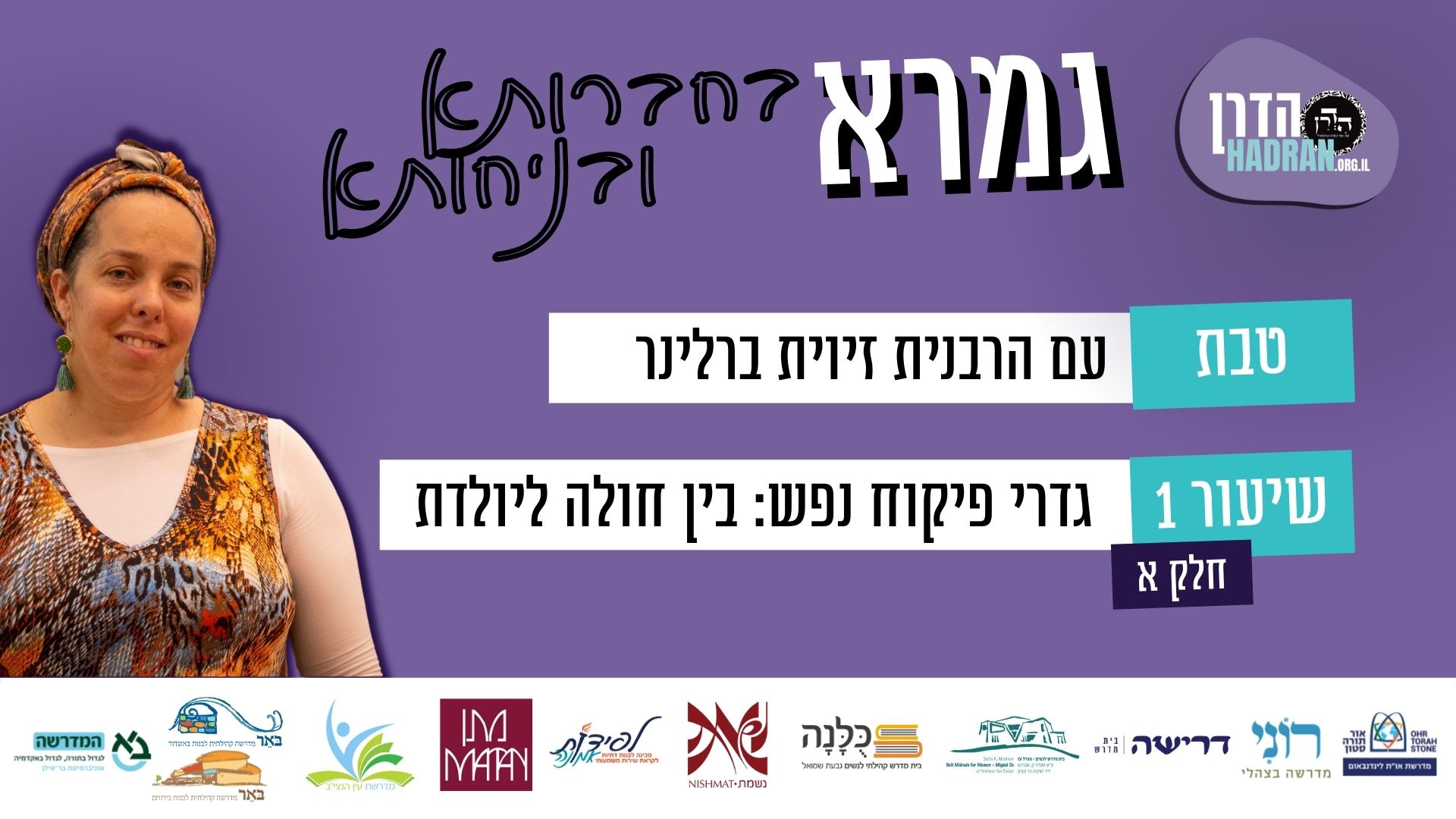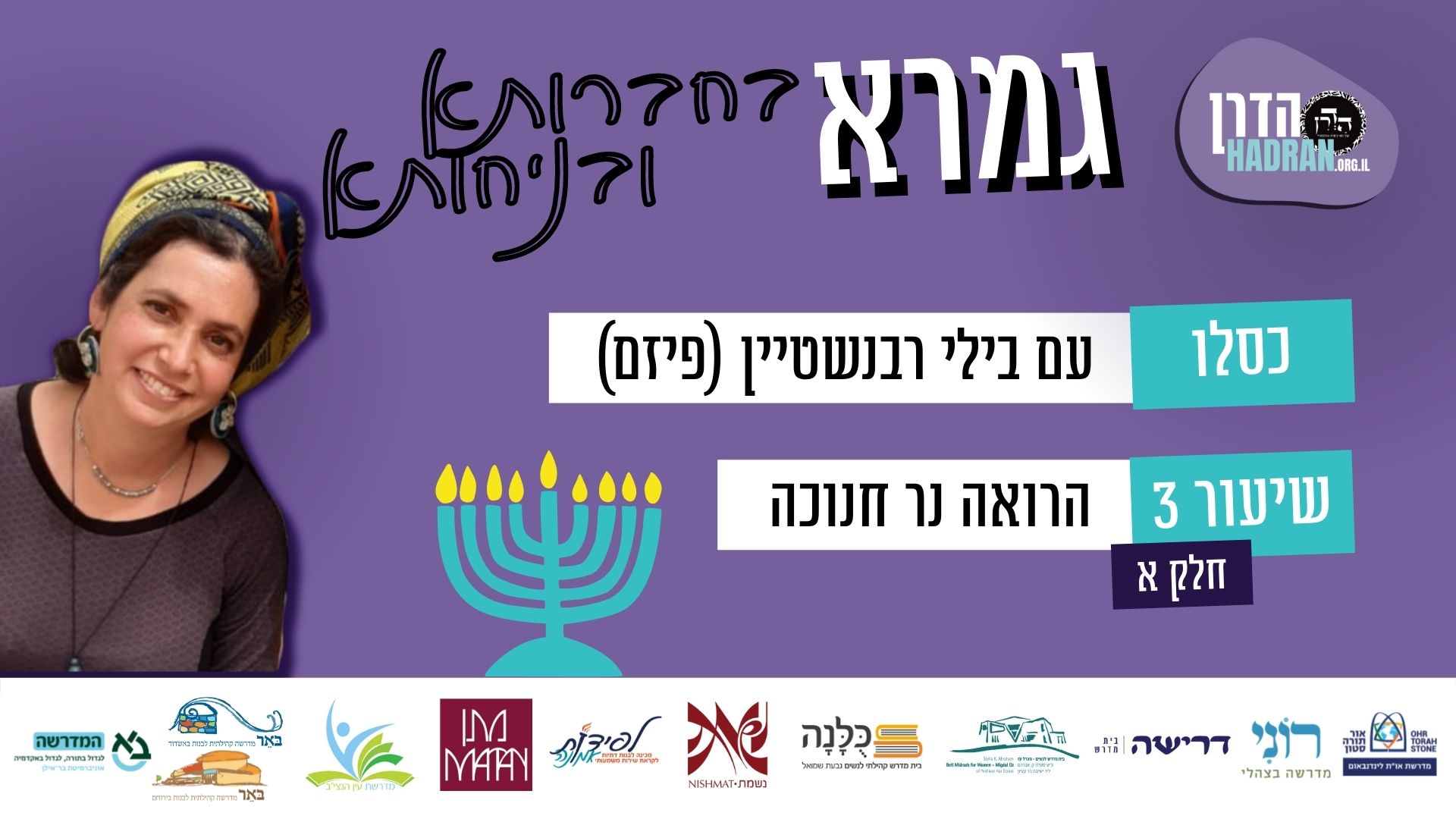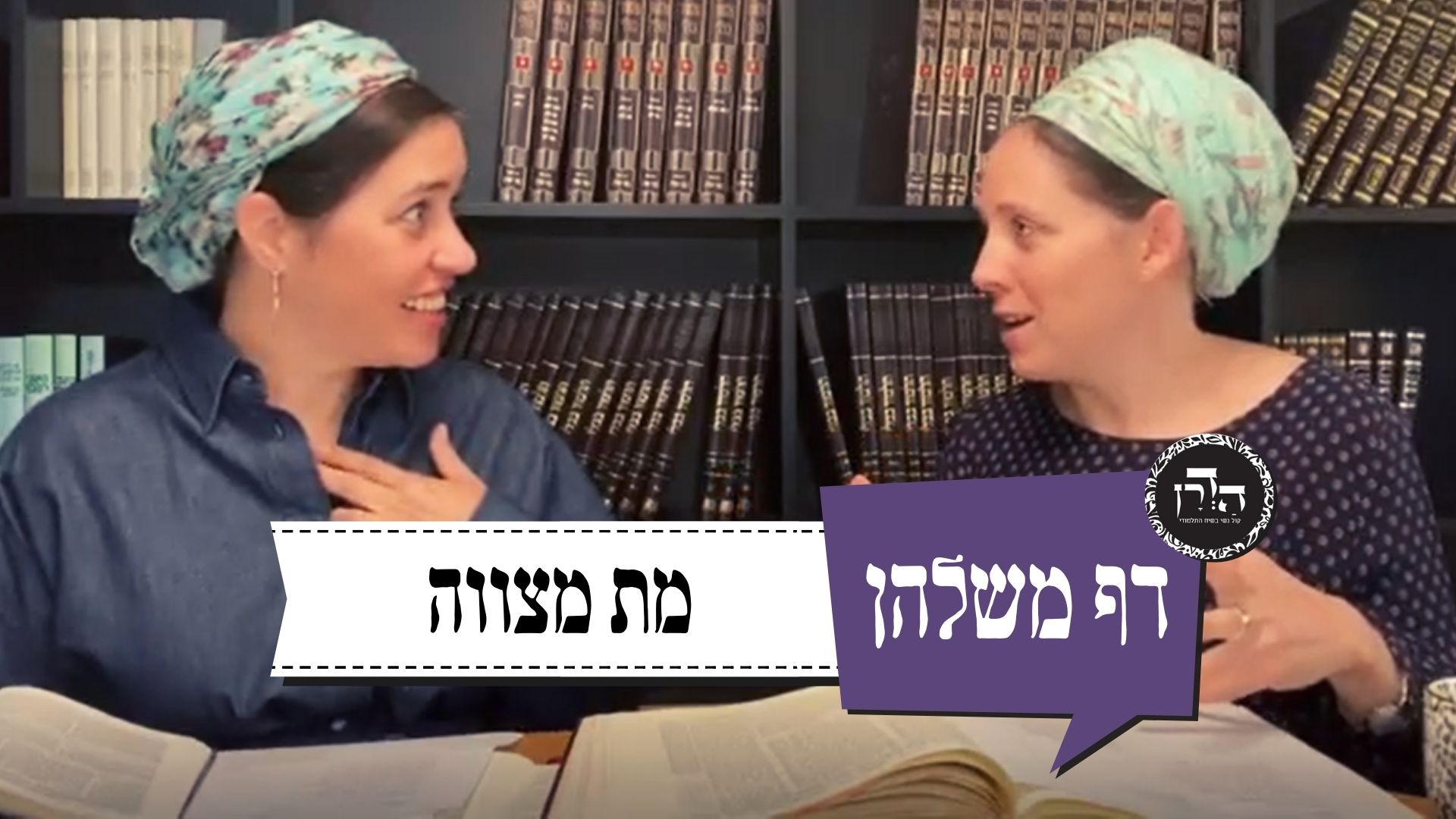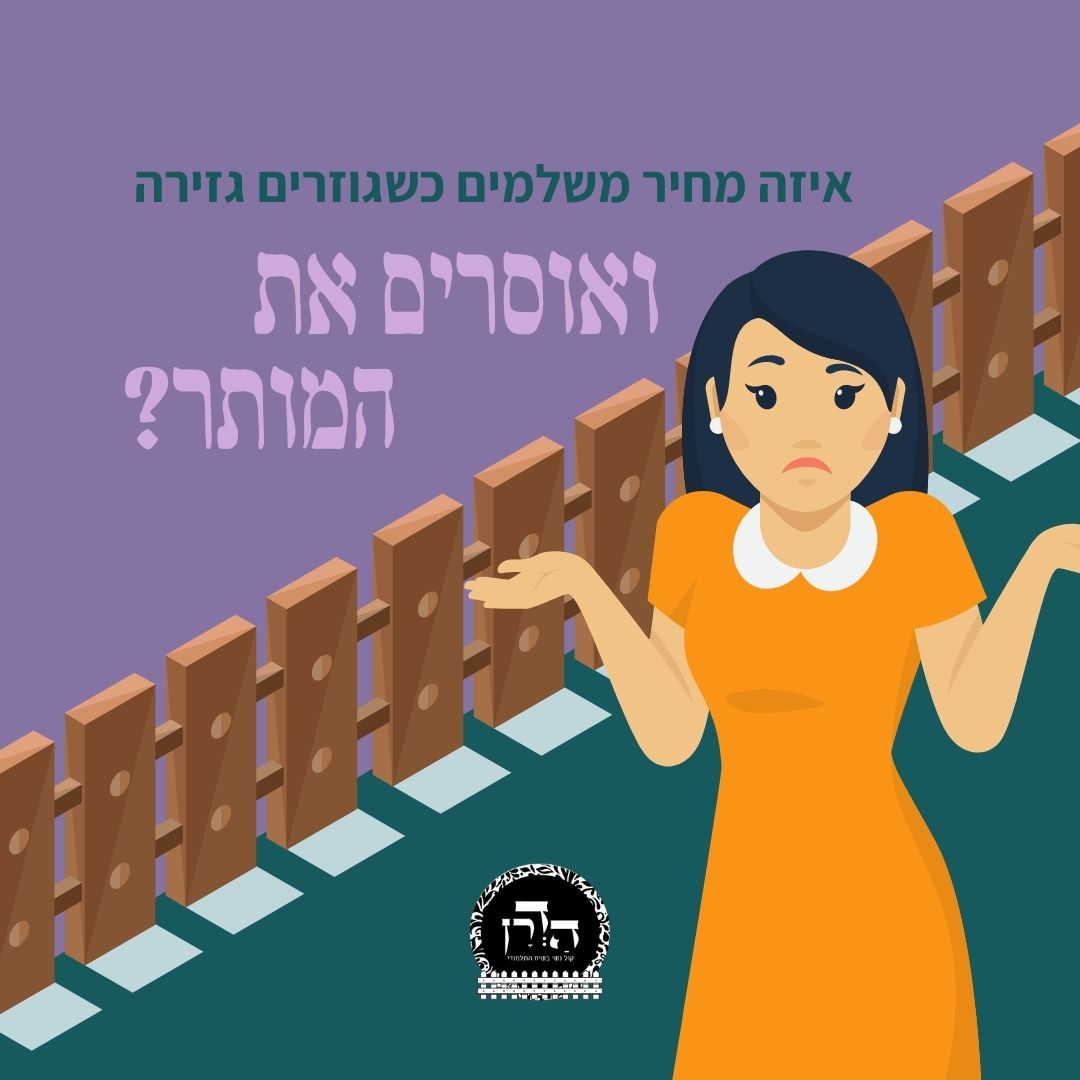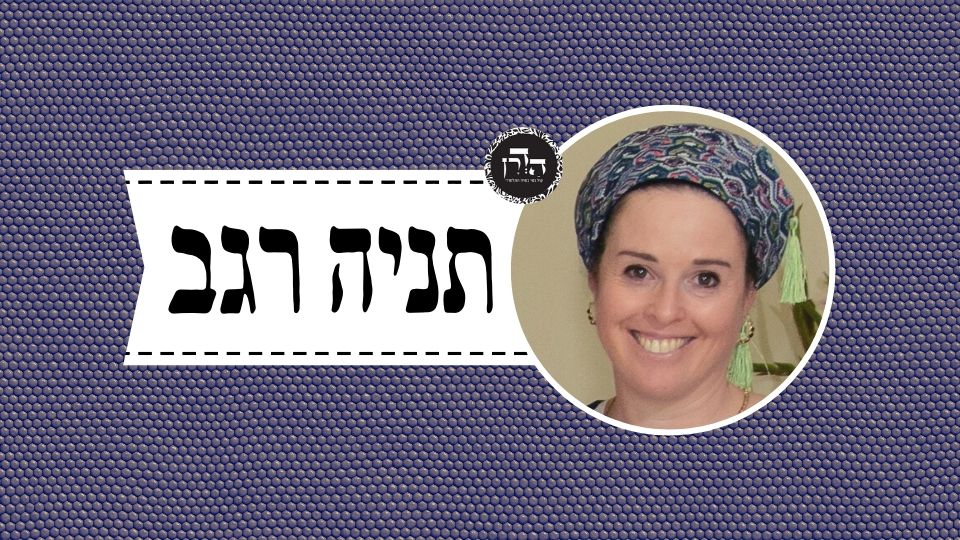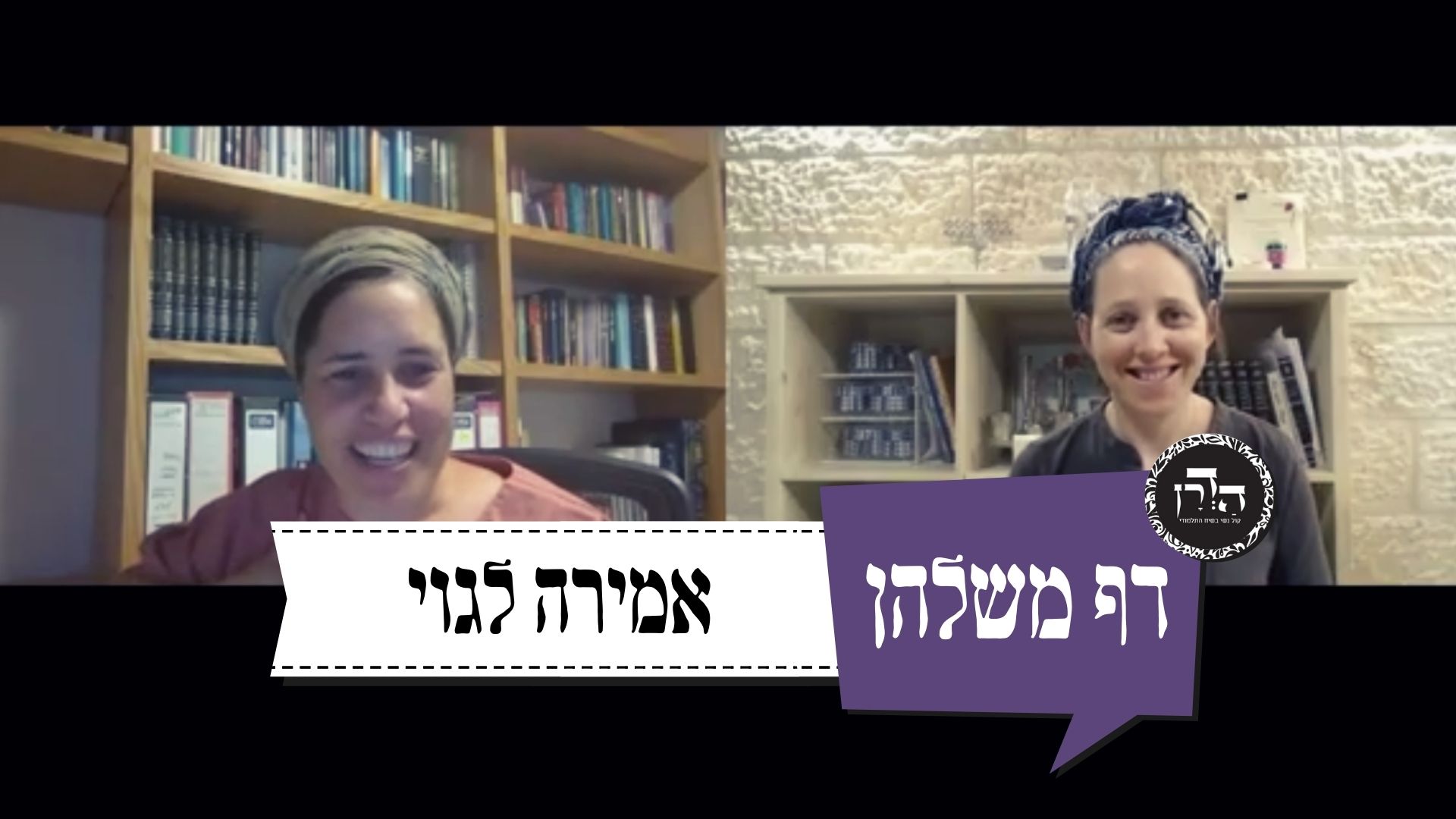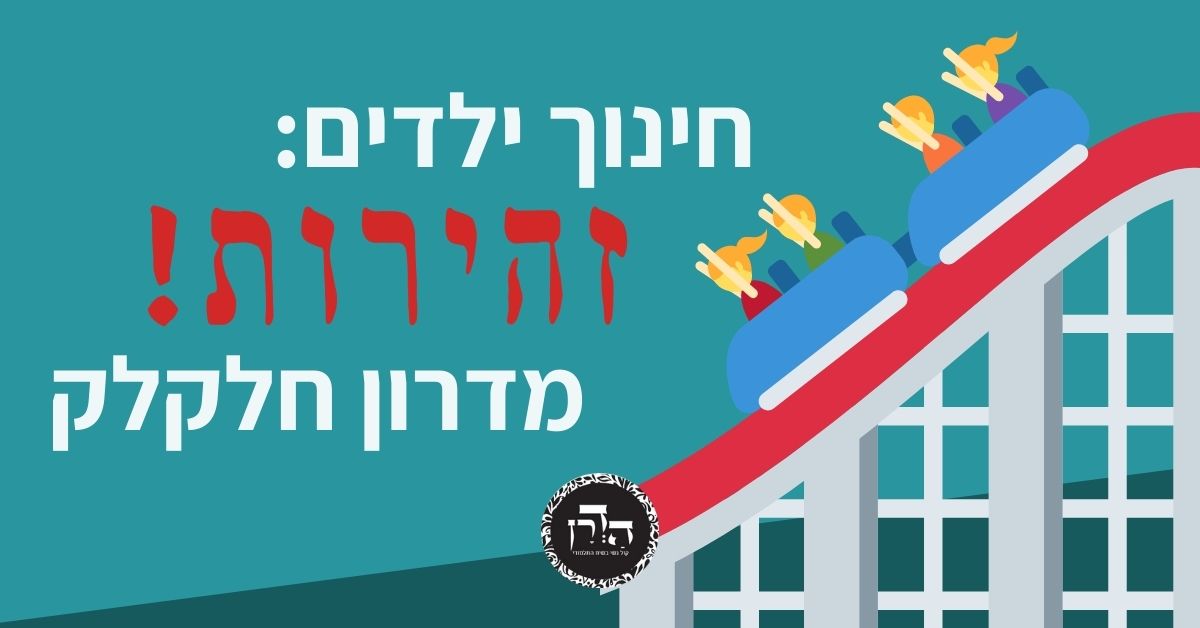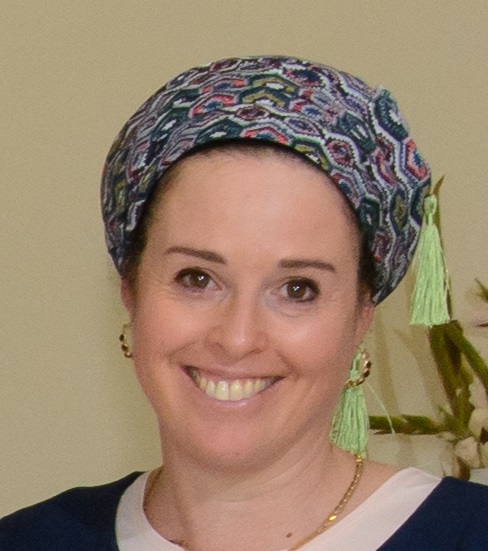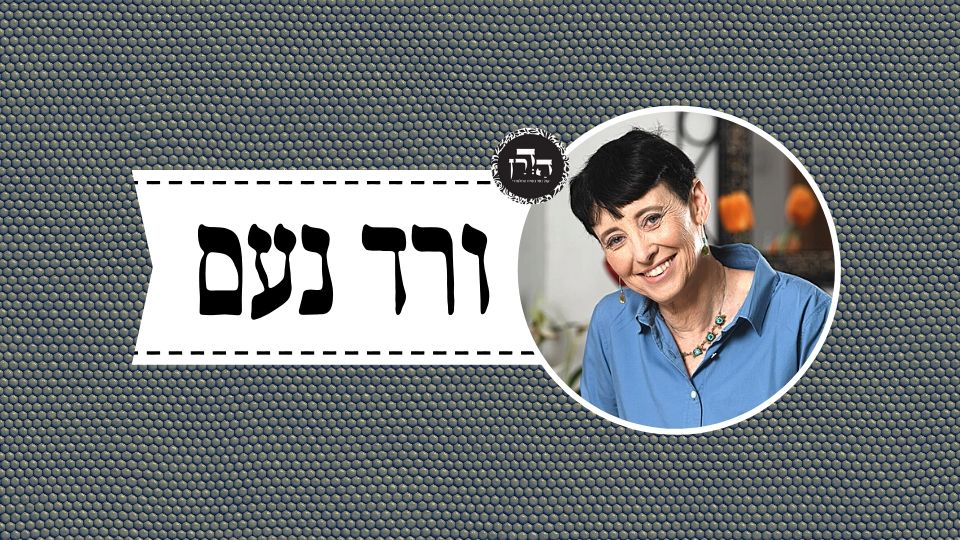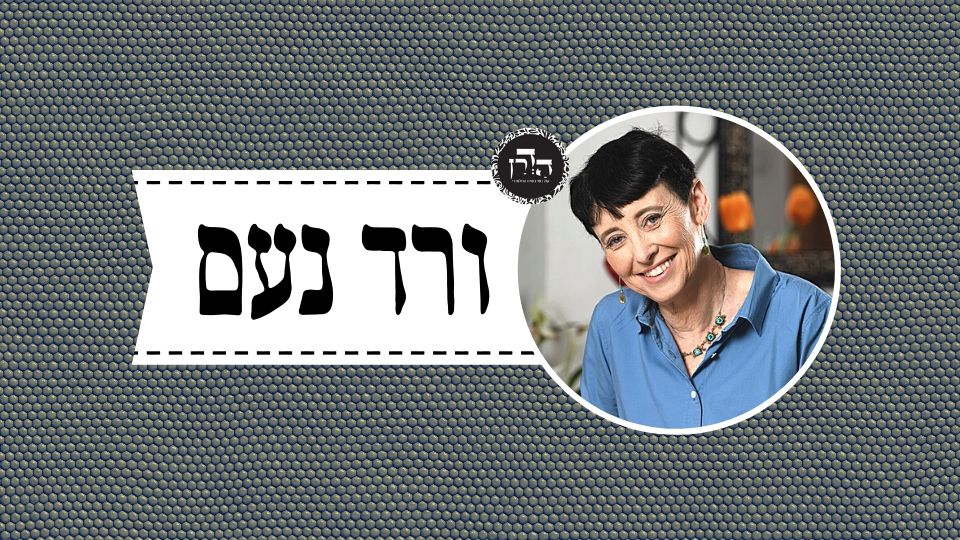שבת קז
גְּמָ׳ אָמַר רַבִּי אַבָּא אָמַר רַב חִיָּיא בַּר אָשֵׁי אָמַר רַב: נִכְנְסָה לוֹ צִפּוֹר תַּחַת כְּנָפָיו — יוֹשֵׁב וּמְשַׁמְּרָהּ עַד שֶׁתֶּחְשַׁךְ. מֵתִיב רַב נַחְמָן בַּר יִצְחָק: יָשַׁב הָרִאשׁוֹן עַל הַפֶּתַח וּמִלְּאָהוּ, וּבָא הַשֵּׁנִי וְיָשַׁב בְּצִדּוֹ, אַף עַל פִּי שֶׁעָמַד הָרִאשׁוֹן וְהָלַךְ לוֹ — הָרִאשׁוֹן חַיָּיב וְהַשֵּׁנִי פָּטוּר. מַאי לָאו, פָּטוּר אֲבָל אָסוּר? לָא, פָּטוּר וּמוּתָּר. הָכִי נָמֵי מִסְתַּבְּרָא, מִדְּקָתָנֵי סֵיפָא: לְמָה זֶה דּוֹמֶה — לְנוֹעֵל אֶת בֵּיתוֹ לְשׁוֹמְרוֹ וְנִמְצָא צְבִי שָׁמוּר בְּתוֹכוֹ, מִכְּלָל דְּפָטוּר וּמוּתָּר! שְׁמַע מִינַּהּ.
GEMARA: Rabbi Abba said that Rav Ḥiyya bar Ashi said that Rav said: If a bird flew under the flaps of one’s clothing on Shabbat and cannot get out, he may sit and secure it until dark and then take it. Rav Naḥman bar Yitzḥak raised an objection based on that which we learned in the mishna: If the first person sat in the doorway and filled it, and a second person came and sat next to him, the first person is liable and the second is exempt, even if the first person stood and went. What, does this not mean here, as it does throughout tractate Shabbat, that he is exempt after the fact, but it is prohibited to do so ab initio? How then could Rav say one may sit and secure the bird ab initio? The Gemara rejects this: No, the statement in the mishna means that he is exempt and it is permitted ab initio. The Gemara adds: So too, it is reasonable to explain the mishna that way from the fact that it was taught in the latter clause of the mishna: To what is this second person’s action similar? To one who locks his house to secure it, and it turns out a deer that was trapped before Shabbat is also secured inside it. By inference, he is exempt and it is permitted, just like one who locks the door to his house. The Gemara concludes: Indeed, learn from it that it is so.
אִיכָּא דְּאָמְרִי, אָמַר רַב נַחְמָן בַּר יִצְחָק: אַף אֲנַן נָמֵי תְּנֵינָא: אַף עַל פִּי שֶׁעָמַד הָרִאשׁוֹן וְהָלַךְ לוֹ — הָרִאשׁוֹן חַיָּיב וְהַשֵּׁנִי פָּטוּר, מַאי לָאו פָּטוּר וּמוּתָּר? לָא, פָּטוּר אֲבָל אָסוּר. הָא מִדְּקָתָנֵי סֵיפָא: הָא לְמָה זֶה דּוֹמֶה — לְנוֹעֵל אֶת בֵּיתוֹ לְשׁוֹמְרוֹ, וְנִמְצָא צְבִי שָׁמוּר בְּתוֹכוֹ, מִכְּלָל דְּפָטוּר וּמוּתָּר. שְׁמַע מִינַּהּ.
Some say a slightly different version. Rav Naḥman bar Yitzḥak said: We too learned support for Rav’s statement in the mishna: Even if the first person stood and went, the first person is liable and the second is exempt. What, does this not mean that he is exempt, and it is permitted? The Gemara rejects this: No, he is exempt and it is prohibited. Rav Naḥman said: That is impossible, from the fact that it is taught in the latter clause of the mishna: To what is this second person’s action similar? To one who locks his house to secure it and it turns out a deer that was trapped before Shabbat is also secured inside it. By inference, he is exempt and it is permitted, just like one who locks the door to his house. The Gemara concludes: Indeed, learn from it that it is so.
אָמַר שְׁמוּאֵל: כֹּל פְּטוּרֵי דְשַׁבָּת פָּטוּר אֲבָל אָסוּר, לְבַר מֵהָנֵי תְּלָת דְּפָטוּר וּמוּתָּר: חֲדָא הָא, וּמִמַּאי דְּפָטוּר וּמוּתָּר? — דְּקָתָנֵי סֵיפָא לְמָה זֶה דּוֹמֶה — לְנוֹעֵל אֶת בֵּיתוֹ לְשׁוֹמְרוֹ, וְנִמְצָא צְבִי שָׁמוּר בְּתוֹכוֹ. וְאִידַּךְ: הַמֵּפִיס מוּרְסָא בְּשַׁבָּת, אִם לַעֲשׂוֹת לָהּ פֶּה — חַיָּיב, אִם לְהוֹצִיא מִמֶּנָּה לֵחָה — פָּטוּר. וּמִמַּאי דְּפָטוּר וּמוּתָּר? דִּתְנַן: מַחַט שֶׁל יָד — לִיטּוֹל בָּהּ אֶת הַקּוֹץ. וְאִידַּךְ: הַצָּד נָחָשׁ בְּשַׁבָּת, אִם מִתְעַסֵּק בּוֹ שֶׁלֹּא יִשְּׁכֶנּוּ — פָּטוּר, אִם לִרְפוּאָה — חַיָּיב, וּמִמַּאי דְּפָטוּר וּמוּתָּר? — דִּתְנַן: כּוֹפִין קְעָרָה עַל הַנֵּר בִּשְׁבִיל שֶׁלֹּא תֶּאֱחוֹז בַּקּוֹרָה, וְעַל צוֹאָה שֶׁל קָטָן, וְעַל עַקְרָב שֶׁלֹּא תִּישֹּׁךְ.
With regard to this issue Shmuel said: With regard to all exempt rulings in the halakhot of Shabbat, although one who performs the action is exempt by Torah law, his action is prohibited by rabbinic law, with the exception of these three for which he is exempt and it is permitted to perform the action.
One is this case of the deer. And from what source do we conclude that one is exempt and it is permitted? From the fact that it was taught in the latter clause of the mishna: To what is this second person’s action similar? To one who locks his house to secure it and it turns out a deer that was trapped before Shabbat is also secured inside.
And another example where he is exempt and it is permitted is: One who drains an abscess containing pus on Shabbat, if he did so to create a permanent opening in it, he is liable. However, if he did so to drain fluid from it, he is exempt. And from what source do we conclude that one is exempt and it is permitted? As we learned in a mishna: A hand needle used for sewing clothes may be moved on Shabbat to remove a thorn. Apparently, removing a thorn on Shabbat is permitted ab initio to the extent that one is even permitted to move a needle for that purpose.
And another case is: One who traps a snake on Shabbat, if he deals with it so that it will not bite him and in doing so traps it, he is exempt. However, if he traps it for medicinal purposes, he is liable. And from what source do we conclude that one is exempt and it is permitted? As we learned in a mishna: One may overturn a bowl on top of a lamp ab initio on Shabbat so that the fire will not take hold in the ceiling beam; and similarly, one may overturn a bowl on top of a child’s feces so that he will not touch it and dirty himself, and on top of a scorpion so it will not bite, and the ruling is the same with regard to a snake.
הדרן עלך האורג
מַתְנִי׳ שְׁמֹנָה שְׁרָצִים הָאֲמוּרִים בַּתּוֹרָה, הַצָּדָן וְהַחוֹבֵל בָּהֶן חַיָּיב, וּשְׁאָר שְׁקָצִים וּרְמָשִׂים, הַחוֹבֵל בָּהֶן פָּטוּר, הַצָּדָן לְצוֹרֶךְ — חַיָּיב, שֶׁלֹּא לְצוֹרֶךְ — פָּטוּר. חַיָּה וָעוֹף שֶׁבִּרְשׁוּתוֹ, הַצָּדָן — פָּטוּר, וְהַחוֹבֵל בָּהֶן — חַיָּיב.
MISHNA: With regard to any of the eight creeping animals mentioned in the Torah, one who traps them or wounds them on Shabbat is liable. The Torah states: “The following shall be impure for you among the creeping animals that swarm upon the earth: The weasel, and the mouse, and the dab lizard of every variety; and the gecko, and the land-crocodile, and the lizard, and the skink, and the chameleon” (Leviticus 11:29–30). With regard to other abominations and crawling things, one who wounds them is exempt. One who traps them for a specific need is liable; one who traps them for no specific need is exempt. With regard to animals or birds that are in his possession, i.e., an animal that is domesticated and under someone’s control, one who traps them is exempt; and, however, one who wounds them is liable.
גְּמָ׳ מִדְּקָתָנֵי ״הַחוֹבֵל בָּהֶן חַיָּיב״ מִכְּלָל דְּאִית לְהוּ עוֹר. מַאן תַּנָּא? אָמַר שְׁמוּאֵל: רַבִּי יוֹחָנָן בֶּן נוּרִי הִיא, דִּתְנַן, רַבִּי יוֹחָנָן בֶּן נוּרִי אוֹמֵר: שְׁמֹנָה שְׁרָצִים יֵשׁ לָהֶן עוֹרוֹת. רַבָּה בַּר רַב הוּנָא אָמַר רַב: אֲפִילּוּ תֵּימָא רַבָּנַן, עַד כָּאן לָא פְּלִיגִי רַבָּנַן עֲלֵיהּ דְּרַבִּי יוֹחָנָן בֶּן נוּרִי אֶלָּא לְעִנְיַן טוּמְאָה, דִּכְתִיב: ״אֵלֶּה הַטְּמֵאִים לָכֶם״, לְרַבּוֹת שֶׁעוֹרוֹתֵיהֶן כִּבְשָׂרָן, אֲבָל לְעִנְיַן שַׁבָּת — אֲפִילּוּ רַבָּנַן מוֹדוּ.
GEMARA: The Gemara asks: From the fact that it is taught in the mishna: One who wounds them is liable, by inference they have skins. One is liable for inflicting a wound only when there is skin covering the flesh and the blood pools beneath it. Who is the tanna who teaches this? Shmuel said: It is Rabbi Yoḥanan ben Nuri, as we learned in a mishna that Rabbi Yoḥanan ben Nuri says: The eight creeping animals that are listed in the Torah have skins. Their flesh transmits impurity, but their skin does not transmit impurity. The Rabbis say that both the skin and the flesh of some creeping animals transmit impurity. Rabba bar Rav Huna said that Rav said: Even if you say that the mishna is in accordance with the opinion of the Rabbis, the Rabbis disagree with Rabbi Yoḥanan ben Nuri only with regard to the matter of impurity, as it is written after the Torah lists the creeping animals: “Those are for you the impure among the creeping animals, whoever touches them when they are dead shall become impure until evening” (Leviticus 11:31). The Rabbis derive from the extraneous term: “Those are for you the impure,” to include the fact that the skins of the creatures in the second verse transmit impurity just as their flesh does. However, with regard to the halakhot of Shabbat, even the Rabbis concede that their skin is distinct from their flesh.
וּלְעִנְיַן שַׁבָּת לָא פְּלִיגִי?! וְהָתַנְיָא: הַצָּד אֶחָד מִשְּׁמֹנָה שְׁרָצִים הָאֲמוּרִים בַּתּוֹרָה, הַחוֹבֵל בָּהֶן — חַיָּיב, דִּבְרֵי רַבִּי יוֹחָנָן בֶּן נוּרִי, וַחֲכָמִים אוֹמְרִים: אֵין עוֹר אֶלָּא
The Gemara asks: And, with regard to Shabbat, they do not disagree? Wasn’t the following taught in a baraita? One who traps one of the eight creeping animals mentioned in the Torah or one who wounds them is liable; this is the statement of Rabbi Yoḥanan ben Nuri. And the Rabbis say: The term skin is utilized only
לְמַה שֶּׁמָּנוּ חֲכָמִים. אַדְּרַבָּה, לְמַה שֶּׁמָּנוּ חֲכָמִים אֵין לָהֶם עוֹר! וְאָמַר אַבָּיֵי, הָכִי קָאָמַר: אֵין עוֹר חָלוּק מִבָּשָׂר אֶלָּא לְמַה שֶּׁלֹּא מָנוּ חֲכָמִים, אֲמַר לֵיהּ רָבָא: הָא ״לְמַה שֶּׁמָּנוּ חֲכָמִים״ קָאָמַר? אֶלָּא אָמַר רָבָא, הָכִי קָאָמַר: אֵין עוֹר מְטַמֵּא כְּבָשָׂר אֶלָּא לְמַה שֶּׁמָּנוּ חֲכָמִים. מִכְּלָל דְּרַבִּי יוֹחָנָן בֶּן נוּרִי הָנָךְ נָמֵי דְּלֹא מָנוּ חֲכָמִים מְטַמְּאִין? וְהָא קָתָנֵי, רַבִּי יוֹחָנָן בֶּן נוּרִי אוֹמֵר: שְׁמֹנָה שְׁרָצִים יֵשׁ לָהֶן עוֹרוֹת וְלֹא מְטַמְּאִין! [אָמַר רַב] אַדָּא בַּר מַתְנָה: תָּרֵיץ הָכִי, וַחֲכָמִים אוֹמְרִים: לְעִנְיַן טוּמְאָה אֵין עוֹר לְמַה שֶּׁמָּנוּ חֲכָמִים.
with regard to those animals enumerated by the Sages as having skin, since their skin is considered by the Sages to be similar to their flesh. The Gemara asks: On the contrary, those that the Sages enumerated, whose skin and flesh are equated, do not have skins. And Abaye said: This is what the tanna in the baraita is saying: Only those that the Sages did not enumerate have skin discrete from their flesh. Rava said to him: Doesn’t the baraita say the opposite: That those enumerated by the Sages have skin discrete from their flesh? Rather, Rava said: This is what the baraita is saying: Only the skin of those animals enumerated by the Sages transmits impurity like flesh. The Gemara asks: Is that to say by inference that Rabbi Yoḥanan ben Nuri holds that even the creeping animals not enumerated by the Sages also transmit impurity? Isn’t the opposite taught, that Rabbi Yoḥanan ben Nuri says: The eight creeping animals have skin that does not transmit impurity? Rav Adda bar Mattana said to resolve it this way: And the Rabbis say: With regard to impurity, those animals enumerated by the Sages do not have skin. According to this explanation, Rabbi Yoḥanan ben Nuri and the Rabbis disagree only with regard to the laws of impurity.
וְאַכַּתִּי, לְעִנְיַן שַׁבָּת לָא פְּלִיגִי? וְהָתַנְיָא: הַצָּד אֶחָד מִשְּׁמֹנָה שְׁרָצִים הָאֲמוּרִים בַּתּוֹרָה, הַחוֹבֵל בָּהֶן — חַיָּיב, בִּשְׁרָצִים שֶׁיֵּשׁ לָהֶן עוֹרוֹת. וְאֵיזוֹ הִיא חַבּוּרָה שֶׁאֵינָהּ חוֹזֶרֶת — נִצְרַר הַדָּם אַף עַל פִּי שֶׁלֹּא יָצָא. רַבִּי יוֹחָנָן בֶּן נוּרִי אוֹמֵר: שְׁמֹנָה שְׁרָצִים יֵשׁ לָהֶן עוֹרוֹת.
But still, is it clear that they do not disagree with regard to the matter of Shabbat? Wasn’t it taught in a baraita: One who traps one of the eight creeping animals mentioned in the Torah on Shabbat is liable, as is one who wounds them, if they are creeping animals that have skins? And what is considered to be an irreversible wound? It is a wound where the blood collects in a single spot beneath the skin, even if it does not emerge. Rabbi Yoḥanan ben Nuri says: The eight creeping animals have skins. Apparently, there is disagreement with regard to Shabbat as well.
אָמַר רַב אָשֵׁי: מַאן תַּנָּא קַמָּא — רַבִּי יְהוּדָה דְּאָזֵיל בָּתַר גִּישְׁתָּא. דִּתְנַן, רַבִּי יְהוּדָה אוֹמֵר: הַלְּטָאָה כְּחוּלְדָּה. אֲבָל רַבָּנַן דִּפְלִיגִי עֲלֵיהּ דְּרַבִּי יוֹחָנָן לְעִנְיַן טוּמְאָה, לְעִנְיַן שַׁבָּת מוֹדוּ לֵיהּ. אִי הָכִי, הַאי ״דִּבְרֵי רַבִּי יוֹחָנָן בֶּן נוּרִי״, ״דִּבְרֵי רַבִּי יוֹחָנָן וּמַחְלוּקְתּוֹ״ מִיבְּעֵי לֵיהּ! תְּנִי: ״דִּבְרֵי רַבִּי יוֹחָנָן בֶּן נוּרִי וּמַחְלוּקְתּוֹ״.
Rav Ashi said: Who is the first tanna? It is Rabbi Yehuda, who follows the texture of the skin. He does not distinguish between those creeping animals whose skin is considered like flesh and those whose skin is discrete from the flesh as the verses may imply; rather, creeping animals are distinguished based on the texture of their skin, as we learned in a mishna that Rabbi Yehuda says: Even though the lizard is mentioned in the verse, it has the same ruling as the weasel because the weasel has skin discrete from its flesh. However, the Rabbis, who disagree with Rabbi Yoḥanan with regard to impurity, concede with regard to Shabbat and hold that all creeping animals have skins. The Gemara asks: If so, the phrase in the baraita: This is the statement of Rabbi Yoḥanan ben Nuri, is difficult. It should have said: This is the statement of Rabbi Yoḥanan ben Nuri and those who disagree with him, as the Rabbis who disagree with him with regard to impurity concede to him with regard to the laws of Shabbat. The Gemara responds: This is not difficult. Emend the baraita and teach: The statement of Rabbi Yoḥanan ben Nuri and those who disagree with him.
בְּעָא מִינֵּיהּ לֵוִי מֵרַבִּי: מִנַּיִן לְחַבּוּרָה שֶׁאֵינָהּ חוֹזֶרֶת? דִּכְתִיב: ״הֲיַהֲפוֹךְ כּוּשִׁי עוֹרוֹ וְנָמֵר חֲבַרְבֻּרֹתָיו״. מַאי ״חֲבַרְבֻּרֹתָיו״? אִילֵּימָא דְּקָאֵי רִיקְמֵי רִיקְמֵי — הַאי ״וְנָמֵר חֲבַרְבֻּרֹתָיו״, ״נָמֵר גְּווֹנָיו״ מִבְּעֵי לֵיהּ! אֶלָּא — כְּכוּשִׁי: מָה עוֹרוֹ דְּכוּשִׁי אֵינָהּ חוֹזֶרֶת, אַף חַבּוּרָה אֵינָהּ חוֹזֶרֶת.
Levi raised a dilemma before Rabbi Yehuda HaNasi: From where is it derived that a wound is defined as something irreversible? He answered him that it is derived as it is written: “Can a Cushite change his skin, or a leopard its spots [ḥavarburotav]?” (Jeremiah 13:23). The Gemara explains: What does ḥavarburotav mean? If you say that they are spotted marks on the leopard’s skin, that phrase: Or a leopard its spots, should have been: Or a leopard its colors. Rather, ḥavarburotav means wounds, and they are similar to the skin of a Cushite: Just like the skin of a Cushite will not change its color to white, so too a wound is something that does not reverse.
וּשְׁאָר שְׁקָצִים כּוּ׳. הָא הוֹרְגָן — חַיָּיב. מַאן תַּנָּא? אָמַר רַבִּי יִרְמְיָה: רַבִּי אֱלִיעֶזֶר הִיא. דְּתַנְיָא, רַבִּי אֱלִיעֶזֶר אוֹמֵר: הַהוֹרֵג כִּינָּה בְּשַׁבָּת — כְּהוֹרֵג גָּמָל בְּשַׁבָּת. מַתְקִיף לַהּ רַב יוֹסֵף: עַד כָּאן לָא פְּלִיגִי רַבָּנַן עֲלֵיהּ דְּרַבִּי אֱלִיעֶזֶר אֶלָּא בְּכִינָּה, דְּאֵינָהּ פָּרָה וְרָבָה. אֲבָל שְׁאָר שְׁקָצִים וּרְמָשִׂים דְּפָרִין וְרָבִין — לָא פְּלִיגִי.
We learned in the mishna: And one who traps other abominations is exempt. The Gemara infers: If one kills them he is liable. The Gemara asks: Who is the tanna who holds this opinion? Rabbi Yirmeya said: It is the opinion of Rabbi Eliezer, as it was taught in a baraita that Rabbi Eliezer says: One who kills lice on Shabbat is akin to one who kills a camel on Shabbat. Apparently, he is the Sage who holds that one is liable for killing any living creature. Rav Yosef strongly objects to this: Perhaps this is not so, as the Rabbis disagree with Rabbi Eliezer only with regard to lice, which do not procreate. However, with regard to other abominations and crawling things that procreate, they do not disagree with him.
וּשְׁנֵיהֶם לֹא לְמָדוּהָ אֶלָּא מֵאֵילִים. רַבִּי אֱלִיעֶזֶר סָבַר כְּאֵילִים: מָה אֵילִים שֶׁיֵּשׁ בָּהֶן נְטִילַת נְשָׁמָה — אַף כֹּל שֶׁיֵּשׁ בּוֹ נְטִילַת נְשָׁמָה. וְרַבָּנַן סָבְרִי כְּאֵילִים: מָה אֵילִים דְּפָרִין וְרָבִין — אַף כֹּל דְּפָרֶה וְרָבֶה. אֲמַר לֵיהּ אַבָּיֵי: וְכִינָּה אֵין פָּרָה וְרָבָה? וְהָאָמַר מָר: יוֹשֵׁב הַקָּדוֹשׁ בָּרוּךְ הוּא וְזָן מִקַּרְנֵי רֵאמִים וְעַד בֵּיצֵי כִינִּים! מִינָא הוּא דְּמִיקְּרֵי ״בֵּיצֵי כִינִּים״.
And fundamentally they both derived this halakha from the reddened ram skins used to cover the Tabernacle. Rabbi Eliezer holds that liability for killing an animal on Shabbat exists only with regard to animals like rams. Just as rams have their lives taken and die, so too, one is liable for killing any animal whose life is taken, including lice. And the Rabbis also hold that liability for killing an animal on Shabbat exists only with regard to animals like rams. Just as rams procreate, so too, one is liable for killing any creature that procreates. One is not liable for killing lice, which do not procreate. Abaye said to Rav Yosef: And lice do not procreate? Didn’t the Master say: The Holy One, Blessed be He, sits and sustains everything from the horns of wild oxen to the eggs of lice? Apparently, lice reproduce by laying eggs. Rav Yosef answered him: There is a species of insect that is called lice eggs, but lice themselves do not actually lay eggs.
וְהָתַנְיָא: טִפּוּיִין וּבֵיצֵי כִינִּים! מִינָא הוּא דְּמִיקְּרֵי ״בֵּיצֵי כִינִּים״. וַהֲרֵי פַּרְעוֹשׁ דְּפָרֶה וְרָבֶה, וְתַנְיָא: הַצָּד פַּרְעוֹשׁ בְּשַׁבָּת, רַבִּי אֱלִיעֶזֶר מְחַיֵּיב וְרַבִּי יְהוֹשֻׁעַ פּוֹטֵר! אָמַר רַב אָשֵׁי: צֵידָה אַהֲרִיגָה קָרָמֵית?! עַד כָּאן לָא פְּלִיגִי רַבִּי אֱלִיעֶזֶר וְרַבִּי יְהוֹשֻׁעַ, אֶלָּא דְּמָר סָבַר: דָּבָר שֶׁאֵין בְּמִינוֹ נִיצּוֹד — חַיָּיב, וּמָר סָבַר: פָּטוּר. אֲבָל לְעִנְיַן הֲרִיגָה — אֲפִילּוּ רַבִּי יְהוֹשֻׁעַ מוֹדֶה.
Again he asked: And wasn’t it taught in the baraita that lists types of creeping animals: Tefuyei, a type of insect, and lice eggs? He answered him: There is a species of insect called lice eggs. Again he asked: And still, there is the issue of a flea, which procreates according to all opinions, and nevertheless, it was taught in a baraita: With regard to one who traps a flea on Shabbat, Rabbi Eliezer deems him liable and Rabbi Yehoshua deems him exempt. Rav Ashi said: Are you raising a contradiction between trapping with killing? Rabbi Eliezer and Rabbi Yehoshua disagree only in that one Sage, Rabbi Eliezer, holds that one is liable for trapping even a species that is not typically trapped; and one Sage, Rabbi Yehoshua, holds that one is exempt in that case. However, with regard to killing, even Rabbi Yehoshua concedes that one is liable.
הַצָּדָן לְצוֹרֶךְ חַיָּיב וְכוּ׳. מַאן תַּנָּא? אָמַר רַב יְהוּדָה אָמַר רַב: רַבִּי שִׁמְעוֹן הִיא, דְּאָמַר מְלָאכָה שֶׁאֵין צְרִיכָה לְגוּפָהּ — פָּטוּר עָלֶיהָ.
We learned in the mishna that one who traps creeping animals for a specific need is liable, but one who traps them for no specific need is exempt. The Gemara asks: Who is the tanna who holds this way? Rav Yehuda said that Rav said: It is Rabbi Shimon, who said that for a prohibited labor performed not for its own sake, one is exempt.
אִיכָּא דְּמַתְנֵי לַהּ אַהָא: הַמֵּפִיס מוּרְסָא בְּשַׁבָּת, אִם לַעֲשׂוֹת לָהּ פֶּה — חַיָּיב, אִם לְהוֹצִיא מִמֶּנָּה לֵחָה — פָּטוּר. מַאן תַּנָּא? אָמַר רַב יְהוּדָה אָמַר רַב: רַבִּי שִׁמְעוֹן הִיא, דְּאָמַר מְלָאכָה שֶׁאֵין צְרִיכָה לְגוּפָהּ — פָּטוּר עָלֶיהָ.
Some taught the statement of Rav in reference to this: With regard to one who drains an abscess in a boil containing pus on Shabbat, if his intention is to create an opening for it he is liable; if his intention is to remove pus from it he is exempt. The Gemara asks: Who is the tanna who holds this way? Rav Yehuda said that Rav said: It is Rabbi Shimon, who said that for a prohibited labor performed not for its own sake, one is exempt.
וְאִיכָּא דְּמַתְנֵי לַהּ אַהָא: הַצָּד נָחָשׁ בְּשַׁבָּת, אִם מִתְעַסֵּק בּוֹ שֶׁלֹּא יִשְּׁכֶנּוּ — פָּטוּר, אִם לִרְפוּאָה — חַיָּיב. מַאן תַּנָּא? אָמַר רַב יְהוּדָה אָמַר רַב: רַבִּי שִׁמְעוֹן הִיא, דְּאָמַר מְלָאכָה שֶׁאֵינָהּ צְרִיכָה לְגוּפָהּ פָּטוּר עָלֶיהָ.
Some teach the statement of Rav as referring to this: With regard to one who traps a snake on Shabbat, if he engages in its trapping so it does not bite him, he is exempt; if he does so for medicinal purposes he is liable. The Gemara asks: Who is the tanna who holds this way? Rav Yehuda said that Rav said: It is Rabbi Shimon, who said that for a prohibited labor performed not for its own sake, one is exempt.
אָמַר שְׁמוּאֵל: הַשּׁוֹלֶה דָּג מִן הַיָּם, כֵּיוָן שֶׁיָּבֵשׁ בּוֹ כְּסֶלַע — חַיָּיב. אָמַר רַבִּי יוֹסֵי בַּר אָבִין: וּבֵין סְנַפִּירָיו. אָמַר רַב אָשֵׁי: לָא תֵּימָא יָבֵשׁ מַמָּשׁ, אֶלָּא אֲפִילּוּ דְּעָבֵד רִירֵי.
Shmuel said: With regard to one who removes a fish from the sea, when an area on the skin of the fish has dried up the size of a sela, he is liable. A fish in that condition cannot survive, and therefore the individual who removed it from the water is liable for killing it. Rabbi Yosei bar Avin said: That is so as long as the skin that dried is between its fins. Rav Ashi said: Do not say that this halakha applies only in a case where it actually dried. Rather, it applies even if the fish has dried to the extent that mucus has formed, and if one were to touch that area it would stick to his fingers.
אָמַר מָר בַּר הַמְדּוּרֵי אָמַר שְׁמוּאֵל: הוֹשִׁיט יָדוֹ לִמְעֵי בְּהֵמָה וְדִלְדֵּל עוּבָּר שֶׁבְּמֵעֶיהָ — חַיָּיב. מַאי טַעְמָא? אָמַר רָבָא: בַּר הַמְדּוּרֵי אַסְבְּרַהּ לִי, לָאו אָמַר רַב שֵׁשֶׁת: הַאי מַאן דִּתְלַשׁ כְּשׁוּתָא מֵהִיזְמֵי וְהִיגֵי מִיחַיַּיב מִשּׁוּם עוֹקֵר דָּבָר מִגִּידּוּלוֹ. הָכָא נָמֵי, מִיחַיַּיב מִשּׁוּם עוֹקֵר דָּבָר מִגִּידּוּלוֹ. אָמַר אַבָּיֵי: הַאי מַאן דִּתְלַשׁ
Mar bar Hamdurei said that Shmuel said: One who reached his hand into the innards of an animal on Shabbat and detached a fetus that was in its womb is liable. The Gemara asks: What is the reason for this? It does not make sense to consider the fetus as a full-fledged living creature. Rava said: Bar Hamdurei explained this to me. Didn’t Rav Sheshet say: One who detaches hops on Shabbat from the shrubs and thorns on which they are growing is liable for uprooting an object from its place of growth? Here, too, in the case of the fetus, one is liable for uprooting an object from its place of growth. Abaye said: One who detached



